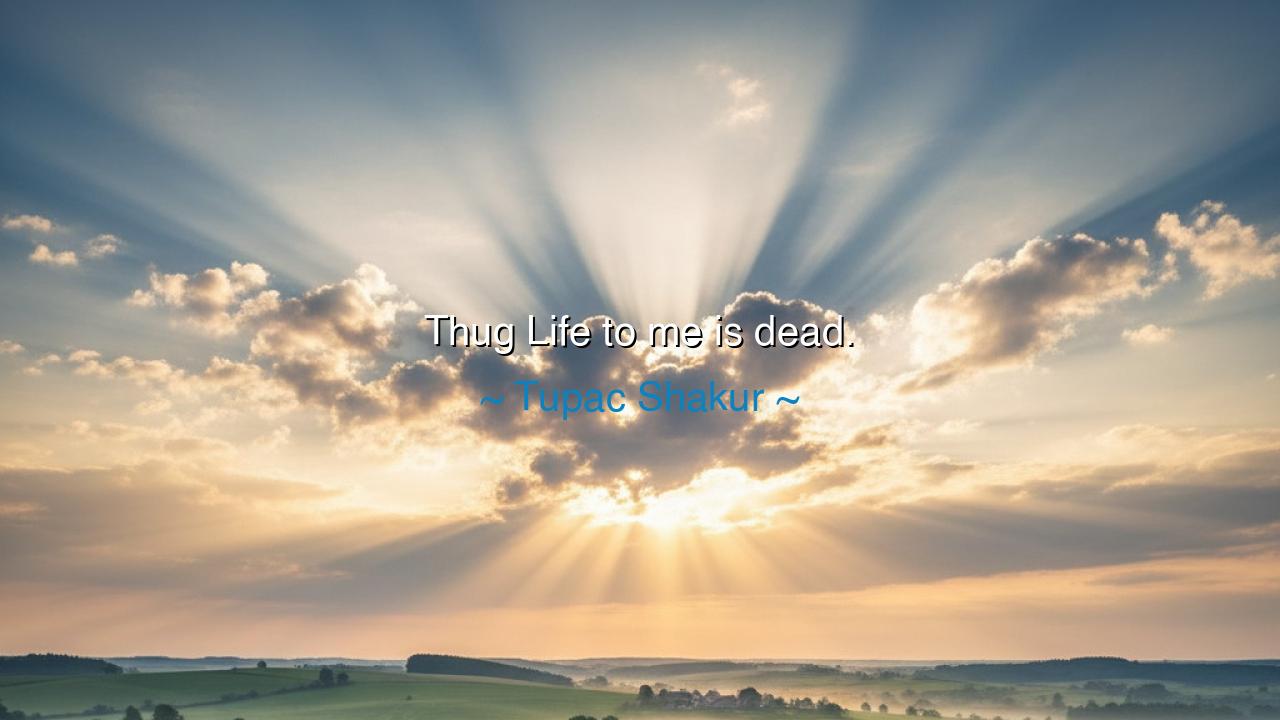
Thug Life to me is dead.






Tupac Shakur, the prophet-poet of the streets, once declared: “Thug Life to me is dead.” These words, stark and mournful, were not only the rejection of a phrase but the cry of a soul who had seen too much blood, betrayal, and destruction. For Tupac himself gave life to the code of Thug Life, not as a glorification of violence, but as a banner for the voiceless—the poor, the oppressed, the forgotten. Yet with time, as the meaning was twisted, as greed and brutality drowned out the deeper message, he declared it dead. His words stand as both lamentation and warning: when ideals are corrupted, they perish, leaving only ashes where once there was fire.
The origin of this statement rests in Tupac’s own creation of the Thug Life philosophy. To him, it meant “The Hate U Give Little Infants F***s Everybody”—a warning that the oppression of the young breeds cycles of violence that return to wound the whole of society. It was a code, a way of surviving the struggle while holding on to dignity, even in the midst of poverty and oppression. But as time passed, others used “Thug Life” to justify lawlessness and destruction, stripping it of its original spirit. Disillusioned, Tupac declared its death, for what he had envisioned as a symbol of resistance had been consumed by chaos.
The ancients, too, knew this cycle. Noble words and movements, born of truth, often become corrupted when ambition, greed, or misunderstanding overtake them. Consider the French Revolution, which began with the cry for liberty, equality, and fraternity. Soon, in the hands of zealots, it turned into the Reign of Terror, drowning its ideals in blood. In the same way, Tupac’s Thug Life—a cry against injustice—was reshaped by others into a hollow symbol of destruction. Thus, his declaration of its death was not the death of his ideals, but the death of their corruption.
History gives us a poignant example in the life of Malcolm X. Once he embraced the anger of vengeance, but later, after pilgrimage and reflection, he rejected that path and embraced a broader vision of unity and justice. He too shed an old skin, declaring the death of one way so that a truer vision might live. Tupac, like Malcolm, recognized that the path of destruction could not carry his people to liberation. To declare “Thug Life is dead” was to cry out for rebirth—for a new way, grounded not in violence, but in dignity, respect, and survival with honor.
The lesson here is sharp: movements and codes of life must be guarded, lest they be twisted into weapons against their own people. Respect and resilience must guide the oppressed, not senseless violence or shallow posturing. Tupac’s rejection of what Thug Life had become is a reminder that the strength of a community lies not in embracing destruction, but in rising above it, turning pain into art, oppression into resistance, and struggle into progress.
Practical actions follow. Do not let your principles be corrupted by those who seek only selfish gain. If you live in hardship, let struggle refine you, not define you. Carry dignity as your weapon, truth as your shield, and respect as your compass. Teach the young that anger alone consumes, but purpose transforms. As Tupac once did, speak for the voiceless, but do not let the message be stolen or hollowed out. Live so that your actions elevate, not destroy, and when an old way becomes rotten, have the courage to declare it dead, and walk a new path.
Thus, O listeners, let Tupac’s words echo across time: “Thug Life to me is dead.” It is the confession of a man who bore the weight of his people’s pain, who gave voice to their anger, yet who recognized that no future lies in cycles of hate. He saw that to rise, the old must be buried, and something new, more just, more true, must be born.
And remember this eternal truth: every code, every banner, every philosophy is judged not by its birth, but by its fruits. If its fruits are destruction, let it die. If its roots are truth, nurture them into new life. For the true Thug Life was never about death—it was about survival, dignity, and respect. What is corrupted may die, but what is true can always rise again.






AAdministratorAdministrator
Welcome, honored guests. Please leave a comment, we will respond soon